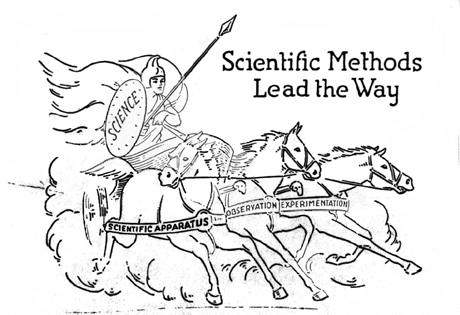
NEDE:
Newton, Darwin, Einstein (Summer 2000)
Hamilton College Site
Center for Talented Youth: Johns Hopkins University
Instructor: Dr. Robinson M. Yost
Teaching Assistant: Michael Loeffler

Illustration from Visualized Modern History (1932)
Description:
Studying the history of science through the careers and influence of Isaac Newton, Charles Darwin, and Albert Einstein clearly illustrates the persistent human desire to describe and explain the natural world. In addition, the historical approach to the "scientific" quests of Newton, Darwin, and Einstein imparts a deeper understanding of how different areas of science have drawn upon and contributed to many other areas of human achievement. Scientific theories have been influenced by society, and, in turn, have influenced societal views. Grappling with the history, the ideas, and the tremendous influence of Newton, Darwin, and Einstein are the primary goals of this course.
As a starting point, consider the following:
According to internalists, since correct science reflects nature, it is unaffected by the human traits of ambition, ideology, prejudice, or dishonesty. . . . According to externalists, by contrast, the science that people produce, just as everything else they do, reflects their biases and wishes and social environment. . . . In reality and quite obviously, internalist and externalist positions are both right and both wrong, because some bits or aspects of science lend themselves to internalist explanation whereas others yield naturally to externalist exegesis.
Henry H. Bauer
Required Readings:
Bowler, Peter J., Evolution: The History an Idea (2d. ed., 1989)
Cassidy, David, Einstein and Our World (1995)
Dobbs, Betty Jo Teeter & Margaret C. Jacob, Newton and the Culture of Newtonianism (1994)
Jacob, James R., The Scientific Revolution: Aspirations and Ideas, 1500-1700 (1998)
in-class handouts
Purposes of this course:
Improving analytical reading, writing, & speaking skills.
Learning how scientific ideas develop in specific historical circumstances.
Practicing analyzing & interpreting facts in historical context.
Practicing thinking historically & asking thoughtful questions.
Assignments:
Tardiness & Breaks: Readings notebook please be on time, return from breaks on time
Timed essays 15 minute break each morning session
In-class writings
Courtesy & Participation:
each student is expected to participate and contribute to general class discussions
we will also work in small groups/everyone will contribute to the discussion
please be polite when you participate, use common courtesy with everyone in the class
Isaac Newton (1642-1727)
1) Introduction
[Monday, July 17] syllabus/quiz
historical facts: evidence & interpretation
reading historical sources/examples of historical context
what is history?/what is science?
2) Background to Newton
[Tuesday, July 18] Greco-Roman philosophy/Aristotle, Ptolemy, Galen
medieval universities & translation/Scholasticism
Renaissance humanism/A Scientific Revolution?
Mechanical Philosophy: Descartes, Gassendi, and others
Protestant Reformation/Cavaliers versus Roundheads
3) Newtons Natural Philosophy: Part I.
[Wednesday, July 19] early life & education: Cambridge, geometry, & experiment
theories of gravity: Hypotheses non fingo?
theories of light: Hypotheses non fingo?
two different traditions: Principia & Opticks
Sir Isaac Newton: The Gravity of Genius [VIDEO]
4) Newtons Natural Philosophy: Part II.
[Thursday, July 20] Never a deist: Newtons roles for God
Reaction to Newtons work: British & Continental
popularization: Newton for the public
deism, materialism, & atheism: Newton and religion
5) Newtonians & the Age of Reason
[Friday, July 21] apotheosis of Sir Isaac Newton: Enlightenment ideals
whats a "Newtonian"?: flavors of Newtonianism
experimental philosophy & mathematical physics
the triumph of "Newtonianism"?
Charles Darwin (1809-1882)
6) Tradition & Change in the Enlightenment
[Monday, July 24] Theories of the Earth's Origins & Argument from Design
Classifying Living Things: Chain of Being & Linnaeus
Water & Fire: Neptunism and Vulcanism
Evolution in the Enlightenment: Erasmus Darwin & J.B. Lamarck
7) Changing Views of Man & Nature
[Tuesday, July 25] Human Nature & Society: Laws to be discovered
Adam Smith & Thomas Malthus: Laissez Faire Economics
Geology (1800-1859): Charles Lyell
Paley, Cuvier, & Chambers
8) Charles Darwin
[Wednesday, July 26] early life & education
Voyage of the Beagle: Galapagos Islands
development of a theory: natural selection
Alfred Russell Wallace & publication: Origin of Species
Charles Darwin: Evolution's Voice [VIDEO]
9) Reception of Darwinism [Thursday, July 27]
promoting evolution: T. H. Huxley, Asa Gray
objections to natural selection
Purpose & Progress in Nature: Theistic Evolution
Religious & Moral Problems
10) Darwinism Applied: Used, & Abused
[Friday, July 28] "Social Darwinism": Society & Imperialism
Herbert Spencer: Survival of the Fittest
Eugenics: Selective Breeding for Humanity
"Darwinism": the broader impact?
Albert Einstein (1879-1955)
11) Nineteenth-Century Physics
[Monday, July 31] Theories of Light & Electro-magnetism
Theories of Energy & Thermodynamics
Turn-of-the-Century Physics: Ether & Energy
Michelson-Morley Experiment: Where's the Ether?
12) Albert Einstein
[Tuesday, August 1] youth & education
1905: annus mirabilis (the "marvelous year")
Special theory of relativity: riding a beam of light?
photoelectric effect: packets of light?
NOVA: Einstein Revealed: Part One [VIDEO]
13) Einstein's Age
[Wednesday, August 2] World War I & Uncertainty
Quantum Theory & Uncertainty
Desperate times: Nationalism & Antisemitism
1915: general theory of relativity
NOVA: Einstein Revealed: Part Two [VIDEO]
14)
Einstein's Impact [Thursday, August 3] Impact on Physics: Relativity
Impact on Physics: The Quantum
Popular Reception of Relativity
Cultural Resonances: Philosophy, Visual Art, Literature
15) Class Conclusion
[Friday, August 4] wrapping up: final discussion & party
significance of Newton, Darwin, Einstein
importance of science?
importance of history?